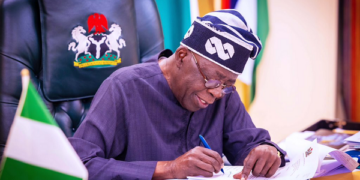Nigeria and the Niger Republic have agreed to coordinate frequency utilization along their borders in order to ensure seamless service deployment between the two sister countries.
On Sunday in Abuja, Dr Reuben Muoka, Director of Public Affairs (DPA), Nigerian Communications Commission (NCC), announced this.
According to Mouka, the signing ceremony was one of the highlights of the two-day Digital Economy Regional Conference hosted by the Nigerian government and facilitated by the Federal Ministry of Communications and Digital Economy.
Prof. Isa Pantami, Nigeria’s Minister of Communications and Digital Economy, signed on Nigeria’s behalf, and Mr Moussa Baraze, Niger Republic’s Minister of Post and New Information Technologies, signed on Niger Republic’s behalf.
According to Mouka, the ceremony was witnessed by NCC’s Executive Vice-Chairman, Prof. Umar Danbatta, and Mrs Aichatou Oumani, Chairperson of the Niger Republic’s National Council for Regulation of Electronic Communications and Post.
He stated that the agreement covered the coordination of frequencies in the Nigeria-Niger transboundary areas ranging from 87.5 megahertz (MHz) to 30 gigatonnes (GHz) (GHz).
“The agreement will help in the effective coordination and sharing of frequencies and channels in the ‘buffer zone or area’ on borderlines between the two countries.
“It will also help to address one of the major issues of signal interference regulation that may arise in telecoms signal transmissions by terrestrial telecoms service providers, as it spells out the procedures for regulating such cases,”he said.
“It will provide, in part, that in case of harmful interference affecting one of the parties, the affected party shall inform the other party in writing for necessary action to be carried out.
Mouka said: “Also, the party from whence the interference is originating shall ensure that all necessary means are used to resolve the harmful interference within 30 days of receipt of the notice.
He stated that the agreement did not affect the parties’ rights and obligations under the Convention.
According to him, the agreement was governed by the International Telecommunication Union’s (ITU) Constitution and other inter-governmental agreements.
They state, among other things, that “land and mobile services whose use is restricted for security, maritime, or national defence purposes, or for which information is unavailable, shall not be subject to the provisions of the agreement.”










Discussion about this post